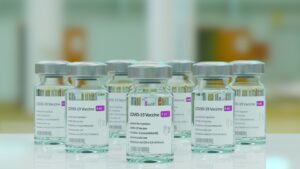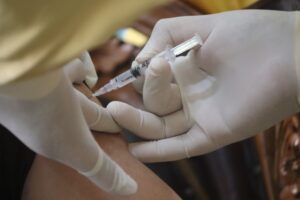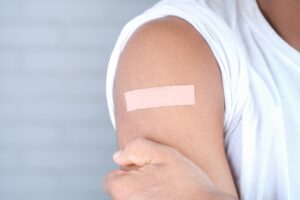
Image c/o Unsplash
Last year we shared an article on how you can observe the National Immunization Awareness Month (NIAM). In this article, we shared the importance of vaccines and how individuals could observe NIAM.
Right in the middle of a pandemic, we, just like most of you, were unsure how soon a COVID-19 vaccine could be made available. While researchers and scientists worked around the clock to develop an effective vaccine, COVID-19 infections were on the rise and the death toll was devastating.
On December 10th, 2020 an FDA advisory panel endorsed the first COVID-19 vaccine. Four days later, on the 14th of December 2020, in New York nurse Sandra Lindsay received the first COVID-19 vaccine– a little hope for normalcy at the end of the tunnel, it felt like.
The vaccine role out in the United States for the Pfizer BioNTech COVID-19 Vaccine began and it was later followed by a second vaccine from Moderna. With an option to receive either of the vaccines, Americans turned out in large numbers.
As more people continued to receive the vaccine, the number of COVID-19 infections began to drop and so did hospitalizations and death rates. In addition to this, states across America were reversing the COVID-19 restrictions- the proverbial light at the end of the tunnel appeared to be getting brighter.
Sadly, just like any other virus, SARS-CoV-2 mutated. The current notable variants in the United States as identified by the CDC include B.1.1.7 (Alpha), B.1.351 (Beta), and B.1.617.2 (Delta).
Of these variants, the Delta Variant has been the most infectious as it has been reported to spread more easily and quickly than other variants.
The New York Times reports that in an internal document by the Centers for Disease Control and Prevention (CDC), the Delta Variant is more transmissible than viruses that cause SARS, MERS, EBOL, the seasonal flu, common cold, and smallpox and it is as contagious as chickenpox.
The CDC, however, reports that the vaccines that have been currently authorized in the United States are effective against COVID-19, including serious outcomes of hospitalization, severe disease, and death. As of July 26th, 2021, it is reported that more than 163 million Americans had been fully vaccinated.
Breakthrough cases among the vaccinated were expected as pointed out by the CDC. However, recent data from the CDC indicates that more than 99.99% of fully vaccinated people have not had a breakthrough case resulting in hospitalization or death. All more reason to consider getting the vaccine ?
Now, we understand that taking these vaccines is optional and we respect the decision of each American who is against taking the vaccine. But we are at a point where a vaccine stands between an individual’s life and death.
Not to mention that we are all tired of living through a pandemic and not being able to enjoy a normal life especially with the return of COVID-19 restrictions in most states.
If you are still undecided, unsure, or probably not well informed on the benefits of getting a COVID-19 vaccine, allow us to share some of the benefits with you.

Image c/o Unsplash
-
Safe and Effective
According to the CDC, the vaccines are safe as they have been developed using science and are not experimental.
The vaccines have been through the necessary clinical trial stages. Extensive testing and monitoring show that these vaccines are safe and effective.
The approved COVID-19 vaccines in the US are effective against the latest Delta Variant as very few cases of serious illness, death and hospitalization have been recorded.
-
Protects Your Loved Ones and Your Community
Before the vaccine roll-out, older people and those with chronic medical conditions were at a higher risk of contracting the virus.
However, as the virus continued to mutate, healthy and young individuals were also at risk.
After vaccines were administered, these cases decreased significantly, making the vulnerable and our communities safe.
Getting vaccinated will not only keep your loved ones safe, but it will also make our communities safer through herd immunity and allow us to return to our normal lives.

Image c/o Pexels
-
Herd Immunity Means a Chance to Return to a Normal Life
After a year of lockdowns, quarantine, and isolation, we are all eager to return to work, family celebrations, and social activities.
The only way to achieve this is herd immunity by getting the COVID-19 vaccination.
Though it remains uncertain when this pandemic will be over, being protected from the virus by getting vaccinated will help us move closer to a normal life.
-
Science is Behind the Vaccine
The development of the COVID-19 vaccines did not take any short-cuts in terms of testing for efficacy and safety.
Developing these vaccines has relied on processes that have been tested and developed for many years.
Such processes made it possible to develop vaccines quickly in case there is an infectious disease pandemic like COVID-19.
-
Diversified Clinical Trials
COVID-19 vaccine clinical trials have included diverse participants as the virus affects everyone.
In their Phase 3 study of the COVID-19 vaccine, Pfizer stated that the efficacy of the vaccine was consistent across age, gender, race, and ethnicity.

Image c/o Unsplash
-
Temporary Side Effects
After receiving the COVID-19 vaccine, individuals may temporarily experience a sore arm, body aches, or a mild fever for a day or two.
These side effects do not mean that you have COVID-19 as the vaccine does not contain the live coronavirus, thus you cannot get COVID-19 from a vaccination.
Side effects signal a natural response as your immune system learns to recognize and fight COVID-19.
-
Allergy Safety Has Been Considered
Information on the vaccine ingredients has been made public on the CDC website to help individuals make an informed decision.
Details on Vaccine Ingredients:
If you are unable to receive a certain type of COVID-19 vaccine because you are allergic to any ingredient in the vaccine, you can consult your physician so that they can recommend a different type of COVID-19 vaccine.
The CDC recommends the vaccine to people with a history of severe allergic reactions not related to the vaccine or injectable medication. Such include food, venom, latex, pet, or environmental allergies.

Image c/o Pexels
-
Expectant or Breastfeeding Mothers and The Infertility Concern
A recent update from the CDC shows that pregnant and recently pregnant people are more likely to get severely ill with COVID-19 compared with non-pregnant people.
In the same update, the ongoing clinical trials based on how the vaccines work alongside safety monitoring systems show that the data does not identify any safety concerns for pregnant people who are vaccinated or their babies.
The American College of Obstetricians and Gynecologists (ACOG) dismisses the claims linking the vaccines to infertility. These are unfounded and have no scientific evidence, therefore the ACOG recommends the vaccine for eligible individuals who may consider pregnancy in the future.
-
A Race Against Time
Vaccine hesitancy and the Delta Variant have been found to fuel the recent surge in COVID-19 cases which has resulted in increased hospitalization rates and deaths.
The CDC reports that vaccinated people can still get infected with COVID-19 but they are far less likely to be hospitalized, get severely sick, or die than unvaccinated people.
Vaccination is the best tool we have for protecting ourselves, our loved ones, and our communities.
Waiting too long to receive the vaccine allows the virus to continue spreading in our communities with a possibility of new variants emerging.
So, the sooner you receive your shot, the sooner you are protected- it is the best way we can observe the National Immunization Awareness Month.

Image c/o Unsplash
Like and follow us on Facebook, Instagram & Twitter.
Subscribe to our YouTube Channel


